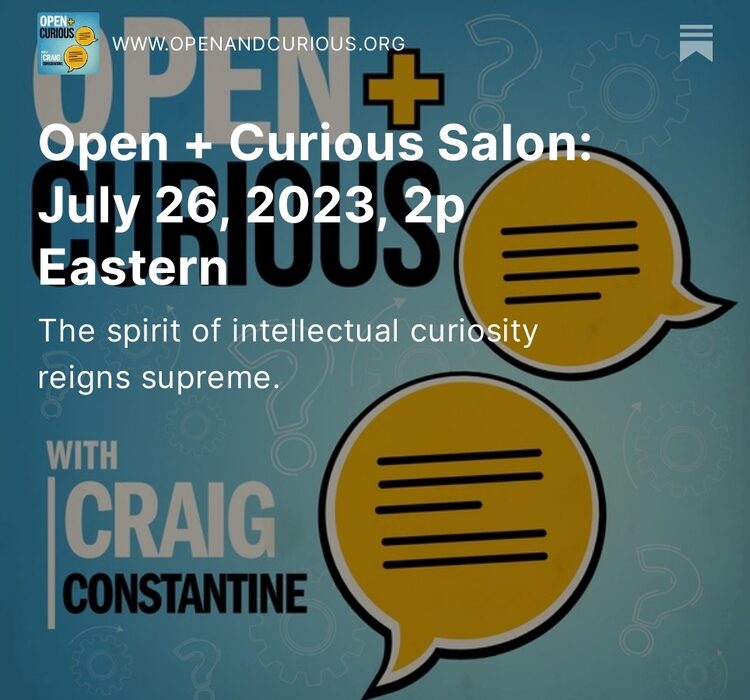Honesty always gets my attention. Not particularly someone who is honest to me, but someone who is honest with themselves.
~ Heath Ledger
slip:4a1227.
Honesty always gets my attention. Not particularly someone who is honest to me, but someone who is honest with themselves.
~ Heath Ledger
slip:4a1227.

Every day, the Little Box of Quotes podcast publishes a super-short recording of a quotation. For over 3 years—1,247 times and counting—I’ve said, “Hello, Craig here! Today from my little box of quotes…”
Why do all this work? It’s fun! I love sharing quotes (and in podcast form is just one way.) The total listens is north of 60,000 and some have been heard many hundreds of times. I like to imagine all the people who smiled, or went “hunh“. Each episode is only downloaded a dozen–or–so times when published. But then each episode slowly gets heard, as people randomly stumble upon them (I know not how.)
Which episodes are popular? Here are the top 10…
What do I think of that top-10 list? Listening to them—especially the number-1 “Habit” quote—makes me squirm. I can hear so much about them that I’d do differently now. Maybe that’s a good thing? And they all seem so silly… it’s just… Craig reading quotes. But there’s definitely something to this, about the resistance and making art.
How do I record them? They’re pretty raw. I say the entirety of what you hear in one pass. If I make a horrible mistake, I just do it over. There’s no editing—I simply have some basic export settings to set the overall level. The point of the entire thing (when I started) was to practice doing the thing. Talk to the mic. Don’t clean it up in post-production… rather, figure out how to not make mouth-noises, how to breath more quietly, how to sound comfortable, etc.
Where do I still struggle? Saying people’s names! (Pronunciation is difficult too, but that’s not what I mean.) The specifics of how I say the name carries a tremendous amount of information. The tiniest change has a huge affect. Do I sound incredulous that that person ever said something that clever? Do I sound overly reverential? Dismissive? And how long do I pause before saying their name? Faced with endless options, I just do my best and then ship it.
What’s my favorite part? (I have a rapid process: record, replay, save/export, schedule podcast episode. I can do one episode in a few minutes.) Sometimes, maybe 1 in 10, when I play it I get chills. Sometimes, the quote itself, combined with countless other details, makes something I just love.
ɕ
The true test of intelligence is not how much we know how to do, but how to behave when we don’t know what to do.
~ John Holt
slip:4a1226.
What are the challenges and opportunities of creating a meaningful podcast that effectively communicates its intended vision and resonates with an audience?
Craig Constantine and Ron Decter discuss the importance of moving towards dialogue rather than a typical Q&A format, making podcasts more engaging.
Ron’s podcast, Simplest State, invites you to explore the mysteries of higher consciousness and the potential of the human mind. They also discuss the struggle of describing one’s show in a few words, highlighting the importance of clarity and coherence in conveying its essence to potential listeners.
Simplest State is for anyone who’s ever felt that there’s something more to life than the mundane, that there’s something beyond the daily routine of life or someone who’s ever felt that the power of the mind is something much more than we have harnessed so far.
~ Ron Decter (10:48)
Takeaways
Embracing Dialogue in Podcasting — Shifting away from a journalistic question-and-answer style can add depth and authenticity
Exploring Profound Topics — Creating podcasts with deep and thought-provoking themes can attract a niche audience seeking intellectual and spiritual exploration.
The Importance of Defining a Podcast’s Essence — The significance of clearly defining a podcast’s essence in concise language.
Resources
Simplest State — Ron’s podcast can be found wherever you normally listen.
Make Noise — Eric Nuzum’s book mentioned in this conversation.
(Written with help from Chat-GPT.)
ɕ
Reading time: About 6 minutes, 1200 words
Get 7 for Sunday in your inbox. → Subscribe here.
This issue is https://7forsunday.com/43
I’ve been creating and capturing conversations for the Movers Mindset podcast for over 5 years. In the beginning the people and the content were directly related to Parkour. But it soon became apparent that there was something more. (Actually, it became apparently that there are two somethings. My general love for the art of conversation is one something. But here, I’m just talking about the other something.) Over the years, the podcast name and descriptions shifted to center on the word “movement” as I tried to point at the something more that I couldn’t identify.
slip:4c2li3.
Physical literacy is often described as the motivation, confidence, physical competence, knowledge and understanding that provides human beings with the movement foundation for lifelong participation in physical activity. Importantly, it incorporates elements that are beyond mere physical development, such as motivation and confidence to move, and ranks them just as highly as attributes like strength and speed. Anyone who trains in parkour for even a single session soon understands just how fundamental these non-physical elements are to our natural movement capabilities, and our potential.
~ Dan Edwardes from, The Power Of Physical Literacy – Dan Edwardes
I’ve been saying for years that in the Movers Mindset podcast, “I talk with movement enthusiasts to learn who they are, what they do, and why they do it.” People often ask me, “what’s the podcast about?” and I’ve always felt that my description doesn’t quite explain it.
But now I know what it’s about.
This article has given me a new phrase: Physical literacy. Thanks, Dan. This isn’t the first thing you’ve given me. (Dan joined me on the podcast back in 2019 for a wonderful in-person conversation titled, Dan Edwardes: Motivation, efficacy, and storytelling.)
ɕ
When the resistance shows up, I know that I’m winning. Not my fight against it, but my fight to make art. […] The resistance is a symptom that you’re on the right track. The resistance is not something to be avoided; it’s something to seek out.
~ Seth Godin
slip:4a1225.
The illiterate of the 21st century will not be those who cannot read and write, but those who cannot learn, unlearn, and relearn.
~ Alvin Toffler
slip:4a1224.
I don’t collect many souvenirs. Sometimes I buy postcards when I visit places… and then I tape those into my journals. But in a very real sense a lot of what I write in my journals is meant to be a souvenir. Either way, the physical or the notational souvenir, is meant to trigger some memory.
Even institutions built for the express purpose of information preservation have succumbed to the ravages of time, natural disaster or human conquest. The famous library of Alexandria, one of the most important repositories of knowledge in the ancient world, eventually faded into obscurity. Built in the fourth century B.C., the library flourished for some six centuries, an unparalleled center of intellectual pursuit. Alexandria’s archive was said to contain half a million papyrus scrolls — the largest collection of manuscripts in the ancient world — including works by Plato, Aristotle, Homer and Herodotus. By the fifth century A.D., however, the majority of its collections had been stolen or destroyed, and the library fell into disrepair.
~ Adrienne Bernhard, from Shining a Light on the Digital Dark Age
slip:4uloie11.
Always I’m thinking: Do I really want to add this thing to my pile? There’s a timeframe of only a few decades where any thing, or notation, has the chance to jog my memory. Sometimes I think of taking a photo… and then I think, why? Why this image right here? Maybe it would be better (I continue thinking) to just relax and enjoy the moment. Even the Library at Alexandria’s enormous collection was surely only a minuscule fraction of what humanity had created to that point. Why take a photo? Why make a notation? Why build a web site? :)
ɕ
People, even more than things, have to be restored, renewed, revived, reclaimed and redeemed. Never throw out anyone.
~ Audrey Hepburn
slip:4a1223.
There is the eternal war between those who are in the world for what they can get out of it and those who are in the world to make it a better place for everybody to live in.
~ George Bernard Shaw
slip:4a1222.

In the tradition of the literary and philosophical movements, each Open + Curious Salon is an opportunity to gather in real-time. It is a space where the exchange of ideas flourishes, where minds come together in spirited discussion, and where conversation skills are honed and practiced. Within the walls of the salon, the spirit of intellectual curiosity reigns supreme.
Details at https://openandcurious.org/
What if I don’t know how to take something apart? One option is to apply excessive force and break the thing open. That works, but obviously sacrifices the thing; this is particularly useless if I wanted to take something apart because I need to fix it, or understand it. Generally, the smash method always works, but is almost never useful.
Yet thought also goes wrong somehow, and produces destruction. This arises from a certain way of thinking, i.e., fragmentation. This is to break things up into bits, as if they were independent. It’s not merely making divisions, but it is breaking things up which are not really spearate. It’s like taking a watch and smashing it into fragments, rather than taking it apart and finding its parts. The parts are parts of a whole, but the fragments are just arbitrarily broken off from each other. Things which really fit, and belong together, are treated as if they do not. That’s one of the features of thought that’s going wrong.
~ David Bohm from, On Dialogue p56
I’m perpetually on a journey of self-awareness. I’m quite often applying my mind to understand things. This idea from Bohm about fragmentation, and in particular fragmentation being bad because it misses out on the relationships and inherent properties of the natural parts (in the sense of disassembled-watch parts versus smashed-watch bits). This idea of fragmentation is a warning against my running with the first way I manage to understand something; just because I’ve found one way to understand (smash) something into understandable pieces, doesn’t mean that’s the best way.
ɕ
Useless to possess an obedient mind unless one profits to the furthest possible degree by its obedience. A prolonged primary course of study is indicated. Now as to what this course of study should be there cannot be any question; there never has been any question. All the sensible people of all ages are agreed upon it. And it is not literature, nor is it any other art, nor is it history, nor is it any science. It is the study of one’s self. man, know thyself.
~ Arnold Bennett
slip:4a1221.